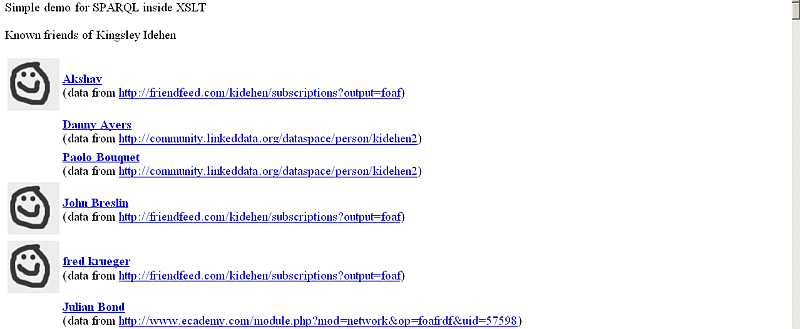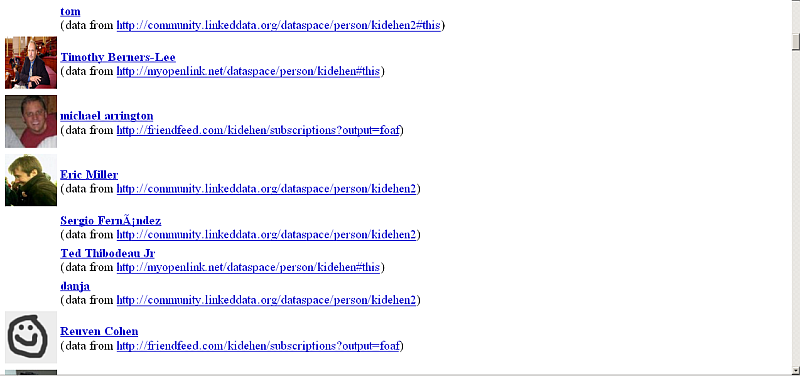Guide to using SPARQL inside XSLT
This guide demonstrates how Virtuoso allows SPARQL queries to be embedded into an XSLT style sheet, and executed against a remote SPARQL endpoint (here, we use the LOD Cloud Cache) to retrieve data for use in HTML output.
Implementation
- The key component of this feature is the
<xsl:for-each-row>control element. This element has one attribute, named either"sparql"or"sql"; the value of the attribute is an XPath expression that returns the text of the query to executed, e.g.,
<xsl:for-each-row sparql="string(\044query)">
- The XPath expression can be a plain string constant, but because the query can be quite long, it is usually more convenient to store the text in a variable and refer to that variable.
- The SPARQL query may contain parameters (written in the form
?:name). A parameter of this sort will get its value from the XSLT variable$name. (If there is any nesting or recursion, the value(s) will come from the innermost variables.) - The query execution in turn creates new XSLT variables that exist inside the body of
<xsl:for-each-row>. Each result column of a query becomes one XSLT variable. - The body of
<xsl:for-each-row>is instantiated once for each row of the query result set, with new values for the variables in each instantiation.
Example
- Execute from iSQL:
SQL> xslt_sheet ('local://friends.xsl', xtree_doc ('<xsl:stylesheet xmlns:xsl = "http://www.w3.org/1999/XSL/Transform" version = "1.0" xmlns:sample="http://xslt/" > <xsl:output method = "html" version="1.0" doctype-public="http://public" doctype-system="http://system" /> <xsl:param name="fname" select="''Kingsley''" /> <xsl:param name="lname" select="''Idehen''" /> <xsl:param name="fullname" select="''Kingsley Idehen''" /> <xsl:variable name = "query"> <![CDATA[ PREFIX foaf: <http://xmlns.com/foaf/0.1/> SELECT DISTINCT ?maxlinkg ?fnick ?ffullname ?ffname ?flname ?fimg WHERE { SERVICE <http://lod.openlinksw.com/sparql/> (DEFINE lang:dialect 65535) { { SELECT DISTINCT ?maxlinkg ?fg ?fnick ?ffullname ?ffname (bif:__max_notnull (?flname1, ?flname2)) AS ?flname ?fimg WHERE { { SELECT (MAX(?linkg)) AS ?maxlinkg ?f WHERE { { SELECT DISTINCT ?k WHERE { GRAPH ?kg { { ?k foaf:firstName ?:fname ; foaf:familyName ?:lname } UNION { ?k foaf:firstName ?:fname ; foaf:family_name ?:lname } UNION { ?k foaf:name ?:fullname } } } } GRAPH ?linkg { ?k foaf:knows ?f } } } GRAPH ?fg { ?f a <http://xmlns.com/foaf/0.1/Person> . OPTIONAL { ?f foaf:firstName ?ffname } OPTIONAL { ?f foaf:nickname ?fnick } OPTIONAL { ?f foaf:name ?ffullname } OPTIONAL { ?f foaf:familyName ?flname1 } OPTIONAL { ?f foaf:family_name ?flname2 } OPTIONAL { ?f foaf:img ?fimg } } FILTER ( bound ( ?ffullname ) || ( bound ( ?ffname ) && ( bound ( ?flname1 ) || bound ( ?flname2 ) ) ) ) } ORDER BY ?fullname ?ffname } } } ]]></xsl:variable> <xsl:template match = "/"> <html><head>Simple demo for SPARQL inside XSLT</head> <body> <p>Known friends of <xsl:choose> <xsl:when test="\044fullname"><xsl:value-of select="\044fullname" /></xsl:when> <xsl:otherwise><xsl:value-of select="\044fname" /> <xsl:value-of select="\044lname" /></xsl:otherwise> </xsl:choose></p> <table> <xsl:for-each-row sparql="string(\044query)"> <tr><td><xsl:if test="\044fimg"><a href="{\044fimg}" ><img src="{\044fimg}" width="64" height="64" /></a></xsl:if></td> <td><a href=".?fname={\044ffname}&lname={\044flname}&fullname={\044ffullname}"> <b><xsl:choose> <xsl:when test="\044ffullname"><xsl:value-of select="\044ffullname" /></xsl:when> <xsl:otherwise><xsl:value-of select="\044ffname" /> <xsl:value-of select="\044flname" /></xsl:otherwise> </xsl:choose></b></a><br /> <xsl:if test="\044fnick">Nick: <xsl:value-of select="\044fnick" /><br /></xsl:if> (data from <a href="{\044maxlinkg}" ><xsl:value-of select="\044maxlinkg" /></a> <!-- and <a href="{\044maxfg}" ><xsl:value-of select="\044maxfg" /></a>-->) </td></tr> </xsl:for-each-row> </table> </body> </html> </xsl:template> </xsl:stylesheet>')); DB.DBA.VHOST_DEFINE ( lpath=>'/friends/', ppath => '/!friends/', is_dav => 1, vsp_user => 'dba', opts => vector('noinherit', 1) ); CREATE PROCEDURE WS.WS."/!friends/" ( INOUT path VARCHAR, INOUT params ANY, INOUT lines ANY ) { http_value (xslt ('local://friends.xsl', xtree_doc ('<fake />'), params)); } ; registry_set ('/!friends/', 'no_vsp_recompile') ;
- Go to http://cname/friends/, where results should look something like this:

